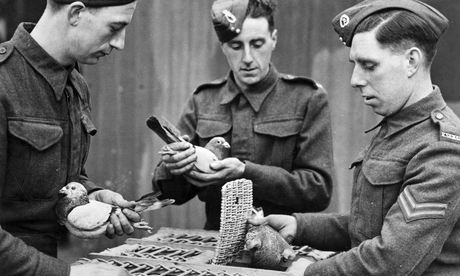
Archie's War is the story of The first world war told through a scrapbook of comic strips, letters, photographs and other war memorabilia collected by Archie Albright, a young boy living in the East End of London. When the local bobby cycles down Archie's street, to announce that war has been declared, Archie thinks it is going to be great good fun! He stops playing marbles and cowboys and Indians and starts playing war games. Then gradually his world begins to change. His dad goes off to war, his mother goes to work in a munitions factory, his sister becomes a pacifist and Grandma Albright takes to whacking him with the back of a hairbrush.
Through Archie's scrapbook collection a picture begins to build up of the impact of war on a family and the progress of the war itself. There are Zeppelin raids, news from the trenches and stories of war heroes. Like many other children, when the bombing and food shortages become unbearable, Archie finds himself moving to the country. Just before he leaves London his dog, Old Georgie, goes missing. Archie is terrified that Old Georgie will make his way home and find the house empty, or worse still that the local butcher has already turned Old Georgie into sausages! Archie also worries that his dad's letters from the trenches, won't get to him in the country – or that his dad won't come home at all.
You'll have to read the book to find out if it's sausages for Old Georgie, or if Archie's dad makes it home! Meanwhile, here are some war facts that Archie collected while creating his scrapbook. They are both amazing and TRUE!
1. Tanks were developed by the British during the first world war
It was TOP SECRET work! Even the factory workers who assembled the vehicles were kept in the dark. They were told they were making mobile water tanks for desert warfare. Tanks were originally called "landships", but this was changed to "tanks" to confuse the enemy.
2. Before the war most women stayed at home or worked in domestic service
Then as increasing numbers of men went off to fight, women had to take over their jobs. Suddenly women were working on the buses, in offices and in factories, all jobs that would have been frowned upon in peacetime. The women who worked in munitions factories were nicknamed "canaries" because their skin sometimes turned yellow when they came into contact with the dangerous chemicals!
3. When the war started, British soldiers went into battle with just a cloth cap for protection
Luckily, steel Brodie helmets were introduced in 1915. The German army called them "Salad Bowls"! They were very uncomfortable, but at least they gave the soldiers some protection.
4. Many people suffered facial injuries during the first world war
As plastic surgery was primitive, artists created copper masks to hide the injuries. The masks were held on by glasses and painted to match each soldier's skin tone. Some even featured eyelashes made from curled metal.
5. The first ever motorized ambulances were used during the first world war
Thousands of men and women volunteered as ambulance drivers including the famous animator Walt Disney!
6. Aircraft were still very new in 1914, so when the Germans launched bombing raids on London, they were carried out from airships, known as zeppelins
British guns tried to shoot them down, but their bullets caused hardly any damage. In 1917, new bullets were invented which ignited the gas inside the Zeppelin and destroyed them. The threat from zeppelins was over!
7. Approximately 16,000 British conscientious objectors refused to fight during the war
Some worked in civilian jobs, others were sent to prison. Many were handed a white feather as a sign of cowardice and to try to shame them into fighting.
8. In 1918 a pigeon, Cher Ami, one of about 100,000 homing pigeons used during the war, managed to save 500 US soldiers
Despite being shot at by German soldiers, Cher Ami bravely delivered a vital message from the soldiers who had been cut off behind enemy lines. She lost an eye and a leg, but US army doctors saved her life and gave her a wooden leg. She was awarded the Croix de Guerre for bravery!
9. Effective gas masks didn't exist at the start of the war
The only protection soldiers had against gas attacks was a cloth, often an old sock, soaked in their own urine.
10. Due to food shortages, Britons were banned from throwing rice at weddings and feeding pigeons
They were also prohibited from talking on the phone in a foreign language, buying binoculars and hailing a cab at night.

